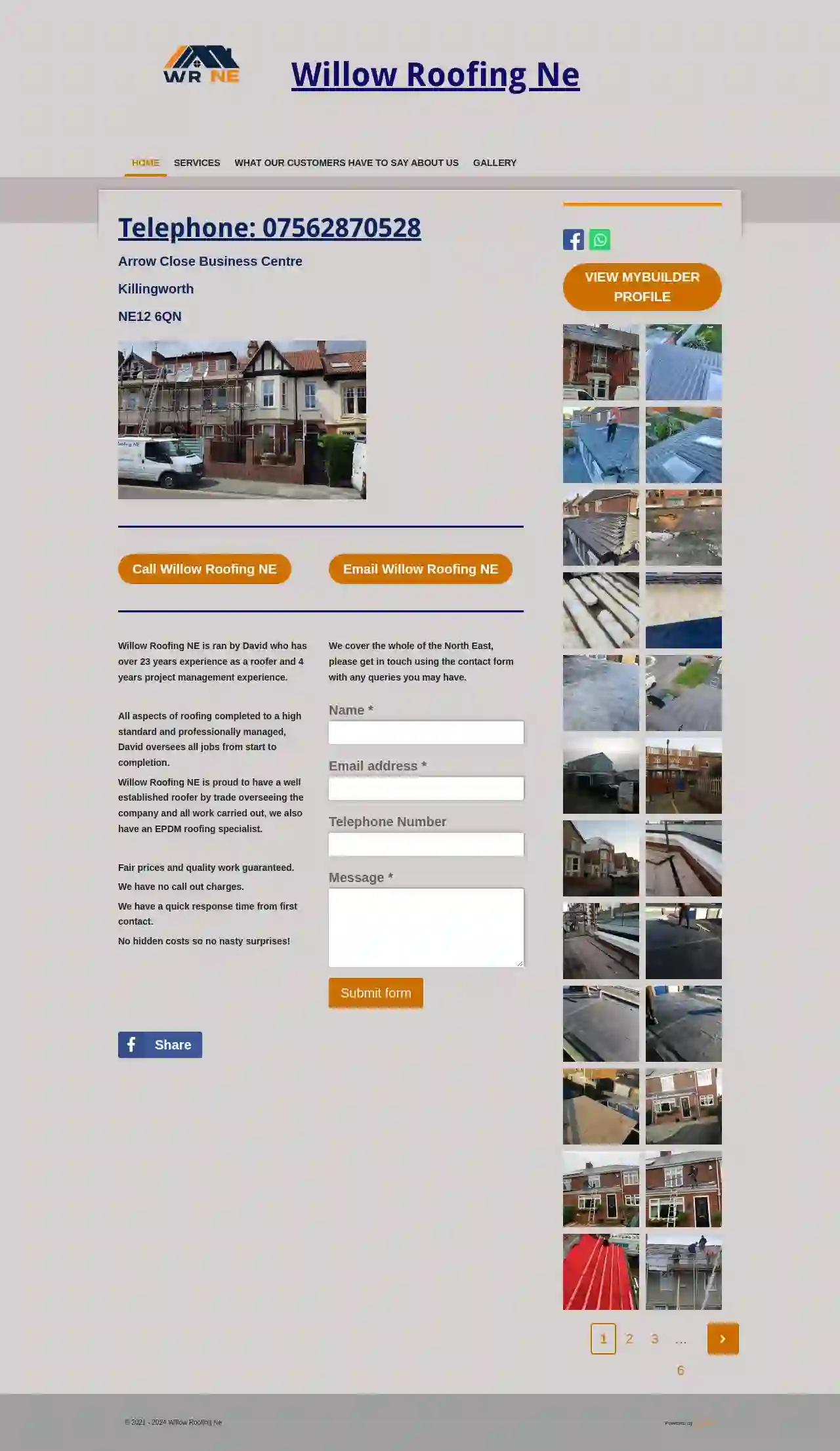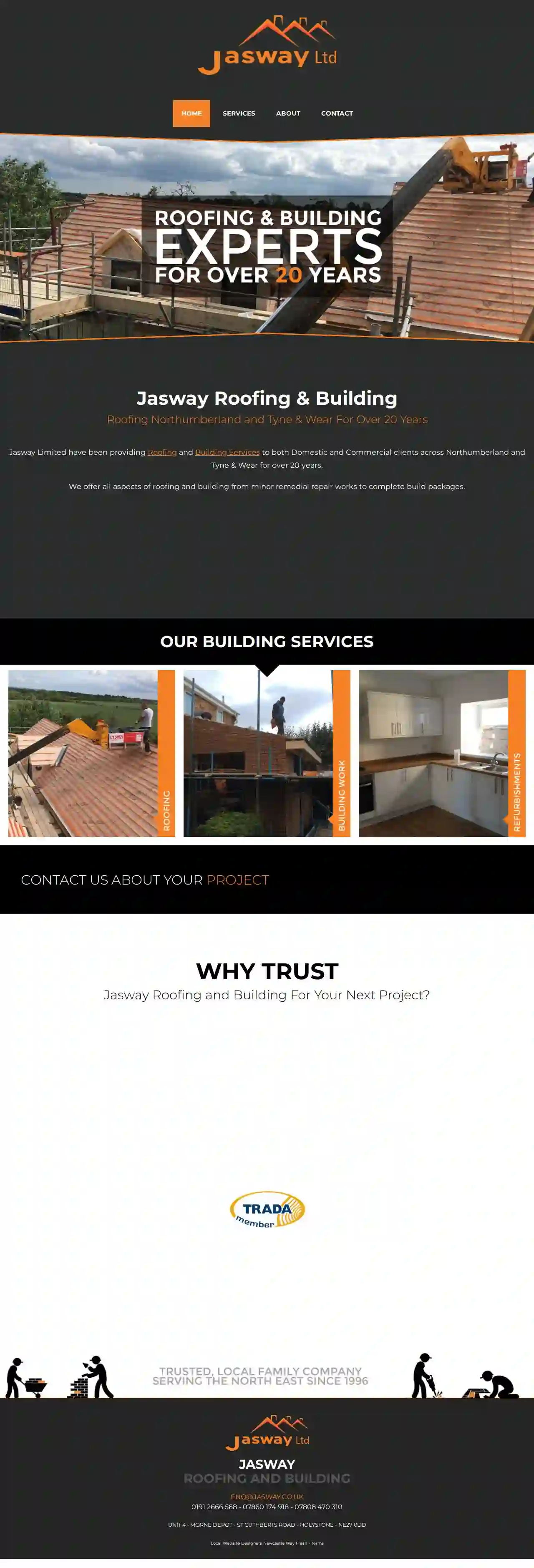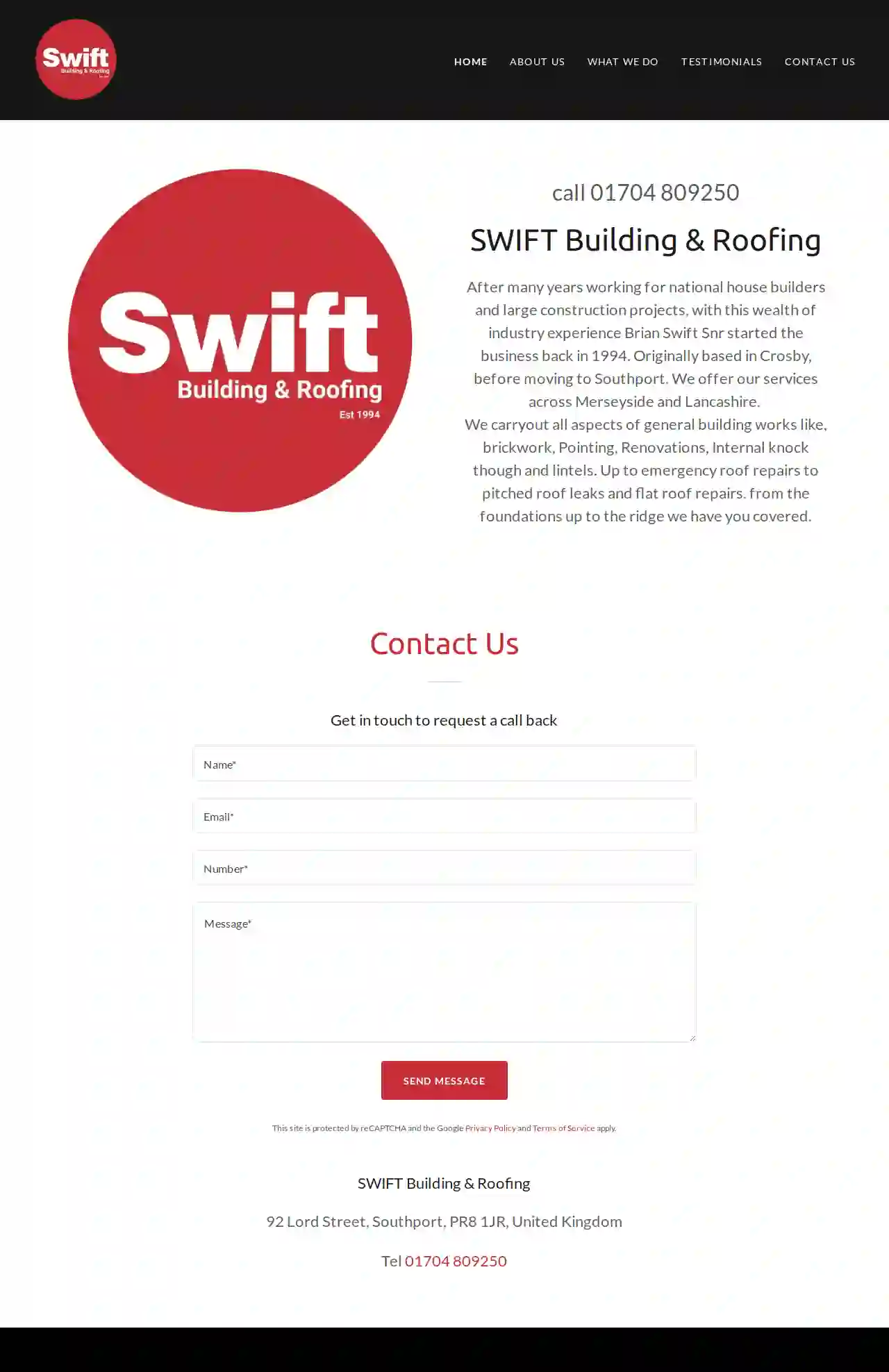Roofing Companies Bootle
Find the best Roofing Companies in Bootle
Get multiple Roofing Contractor quotes for your project today! Compare profiles, reviews, accreditations, portfolio, etc... and choose the best service.

Premier Roofing Solutions Ltd
511 reviewsSouthport, GBPremier Roofing Solutions are your professional roofing service with over 20 years experience in all aspects of roofing work serving the North West of England. All work we undertake is completed to a high standard and we take pride in every job we complete. We are specialists in GPR, high performance felt systems, all pointing works, slating, tiling, all guttering solutions, UPVC fascia, UPVC soffits, Velux windows, skylights and sun tunnels. We have affiliated with the NFRC, the Country’s leading Federation for Roofing Contractors. This, together with our accreditations from some of Britain’s premier roofing suppliers assure our clients of the quality and standard of work that we complete.
- Services
- Why Us?
- Accreditations
- Our Team
- Testimonials
- Gallery
Get Quote
Mj Taylor and Son ltd
London, UK, 123 Main Street, SW1A 1AA, GBMJ Taylorson Ltd is a leading provider of [insert services] with a strong focus on [insert values]. Our team of experts has [insert number] years of combined experience in [insert industry/field]. We pride ourselves on our commitment to [insert value] and our ability to deliver [insert benefit].
- Services
- Why Us?
- Accreditations
- Our Team
- Testimonials
- Gallery
Get Quote
Chris Moody Roofing
4.979 reviewsUnit 1 West Park View, Dudley, Cramlington, NE23 7AA, GBChris Moody Roofing and Building is a 'Checked and vetted' & 'Trading standards approved' family run business based in Wideopen, Newcastle. Trading since 2011, with over 15 years’ experience in the roofing and building trade. We specialise in all types of roofing and external building works. We pride Ourselves on our commitment to provide a Professional, Personal and Speedy service from quote to completion, whilst maintaining the highest quality of work and using top quality materials.
- Services
- Why Us?
- Accreditations
- Our Team
- Testimonials
- Gallery
Get Quote
Willow Roofing NE
59 reviewsArrow Close Business Centre, Killingworth, NE12 6QN, GBWillow Roofing NE is a roofing company run by David, who has over 23 years of experience as a roofer and 4 years of project management experience. We take pride in our well-established roofer and EPDM roofing specialist overseeing all work. We offer a range of services, including slating, tiling, full roof replacements, small repairs, roofline work, flat roofs, EPDM, leadwork, re-pointing, dry verge, dry ridge, solar panel removal and refitting, conservatory roof replacements, and Velux window fitting. We also offer cladding services. All our quotes are free of charge, and we'll discuss everything with you to give you peace of mind. We are professional from beginning to end. We cover the whole of the North East. Contact us using the form on the website for any queries.
- Services
- Why Us?
- Our Team
- Gallery
Get Quote
Roofscape (NW) Ltd
38 reviewsSouthport Business Park, Unit 1, 10-12, Southport, PR9 0AA, GBRoofscape (NW) Ltd is a roofing company based in Southport, serving both domestic and commercial clients. With years of experience, they pride themselves on delivering high-quality workmanship and customer satisfaction. Their team of skilled roofers is dedicated to providing expert advice and solutions for all your roofing needs, from repairs and maintenance to complete roof replacements. They offer free quotations and are committed to providing transparent and competitive pricing. Roofscape (NW) Ltd is fully accredited and insured, ensuring peace of mind for their clients.
- Services
- Why Us?
- Accreditations
- Our Team
- Gallery
Get Quote
Jasway ltd (roofing & building)
51 reviewsSt Cuthberts Road, Holystone, Unit 4, Morne Depot, NE27 0DD, GBJasway Roofing & Building Roofing Northumberland and Tyne & Wear For Over 20 Years Jasway Limited have been providing Roofing and Building Services to both Domestic and Commercial clients across Northumberland and Tyne & Wear for over 20 years. We offer all aspects of roofing and building from minor remedial repair works to complete build packages.
- Services
- Why Us?
- Gallery
Get Quote
Bryan Crisp & Son Specialist Services Ltd
52 reviewsSouth Nelson Industrial Estate, 22 S Nelson Rd, Cramlington, NE23 1WF, GBBryan Crisp & Son Specialist Services Limited is a family-run business established in 1980. Based in Cramlington, Northumberland, we serve a wide area encompassing Northumberland up to the Scottish borders, Cumbria, County Durham, and Yorkshire. Our expertise spans various sectors, including public buildings, hospitals, schools, academies, industrial, and commercial housing. We specialize in flat roofing, single ply, slating and tiling, architectural guttering (cast and aluminium), roof coatings, re-roofing, maintenance, and repairs, as well as UPVC gutters and fascias. As members of NRFC, CHAS, constructionline, and IMA (Intelligent Membrane Association), we are committed to delivering top-quality service and customer satisfaction. We pride ourselves on our extensive experience in all types of roofing and offer complete flexibility to bring your roofing dreams to reality. Contact us today for a free quote and let us handle your roofing needs with expertise and care.
- Services
- Why Us?
- Accreditations
- Our Team
- Gallery
Get Quote
swift building and roofing
92 Lord Street, Southport, PR8 1JR, GBSWIFT Building & Roofing has been serving the Merseyside and Lancashire areas since 1994. Brian Swift Snr, with years of experience working for national house builders and large construction projects, started the business. We offer a wide range of services, from general building works like brickwork, pointing, renovations, internal knock-throughs, and lintels to emergency roof repairs for both pitched and flat roofs. We handle all aspects of your project, from the foundations to the ridge. We are a local, fully registered, insured, and qualified team, holding City & Guilds, NVQ, and CITB accreditations. We are committed to continuous learning and improvement, regularly attending CDP courses to stay up-to-date with building regulations and new technologies. We provide free, no-obligation quotations for all your home or business projects.
- Services
- Why Us?
- Our Team
- Testimonials
- Gallery
Get Quote
Level UP Lofts & Roofing ltd - Loft conversion specialists
56 reviewsUnit 8, George Business Park, Cemetery Road, Southport, PR8 5EG, GBLevel Up Lofts conversions provide our customers with a total "One Stop Shop" project management service from the development of your bespoke design until handover, which is always on time & always on budget. We can recommend one of our preferred Architects that we work with successfully on a regular basis.We will help you fit-out your space with any bespoke joinery requirements such as bedroom, office or gym furniture, just leaving you to complete the painting & decorating.Communication: We work well with our customers, communicating effectively at every stage on the programme progress and design development & improvement ideas.Installation: Our professional, motivated & friendly installation team will not leave your project until the construction is complete and you are 100% happy with all aspects of the conversion. All are staff are time served tradesmen for their respective individual trades. All electrical work undertaken comes with a full NIC certification. Guarantee: We are pleased to offer a 10-year Guarantee on all our works.Property Protection: All projects will involve scaffolding, skip hire and an outside workers toilet which will be installed ensuring your property's total protection. 90% of the construction materials essential for any loft conversion are mechanically lifted onto the scaffolding and enter the property through the roof. We will need entry to your property towards the end of the development when the stairs will need to be installed, taking every insurance to reduce disturbance to the occupants of the house. A full carpet protection system is laid to all necessary areas.Payment: We operate on a weekly payment structure running for the length of the development the first payment would be due after our first full week on site. This arrangement safeguards that we only ever request payments for any works that has previously been carried out.Experience: With over 20 years’ experience, our team of dedicated and professionally-qualified staff are totally focused on delivering your bespoke, beautiful, innovative & competitive designs.Questions: If you have any questions, please get in touch via our Contacts Page and you can also see our comprehensive FAQ page.One of the many benefits that Level Up Lofts deliver to our customers is that we part of the Roof Building Constructions company which have undertaken hundreds of roofing & building projects. Our experience in these elements ensure that we always deliver a successful project on time and on budget.
- Services
- Why Us?
- Gallery
Get Quote
Crosby Roofing Ltd
2.48 reviewsUnit 1, 100-102 Whalley Road, Accrington, BB2 7AA, GBCrosby Roofing Ltd is a family-run business with over 25 years of experience in the roofing industry. We are a fully insured and accredited company, dedicated to providing high-quality roofing services to both domestic and commercial clients. Our team of skilled roofers is committed to delivering exceptional workmanship and customer satisfaction. We offer a wide range of roofing services, including new roof installations, roof repairs, roof maintenance, and more. We pride ourselves on our attention to detail, reliability, and competitive pricing.
- Services
- Why Us?
- Accreditations
- Our Team
- Testimonials
Get Quote
Over 12,314+ Roofers in our network
Our roofing experts operate in Bootle and beyond!
Roofyng.co.uk has curated and vetted the Best Roofing Companies in and around Bootle. Find a top & reliable contractor today.
Frequently Asked Questions About Roofing Companies
- Leaks or Water Stains: Water stains on ceilings or walls, dripping water, or dampness in the attic.
- Missing, Cracked, or Curled Shingles: Inspect for damaged or missing shingles, especially after a storm.
- Damaged Flashing: Look for rust, corrosion, or gaps in flashing around chimneys, vents, or skylights.
- Sagging or Uneven Rooflines: A sagging roof could indicate structural problems.
- Granule Loss: Excessive granules in gutters suggest aging asphalt shingles.
- Moss or Algae Growth: Can trap moisture and damage roofing materials.
- Ventilation: Soffit vents provide intake ventilation, allowing fresh air to enter the attic and regulate temperature and moisture.
- Aesthetics: It creates a finished look to the roof's underside.
- Pest Control: A properly sealed soffit prevents pests like birds and squirrels from nesting in the attic.
- Safety First: Avoid going onto the roof during a storm, as it's dangerous.
- Document the Damage: Take photos and videos of the damage for insurance purposes.
- Contact Your Insurance Company: Report the damage to your insurance company as soon as possible to initiate a claim.
- Temporary Repairs: If safe, address any immediate leaks using buckets or tarps to minimize further damage.
- Contact a Roofing Contractor: After the storm, have a qualified roofing contractor inspect the roof and provide a repair estimate.
- Home Improvement Loans: Offered by banks or credit unions.
- Home Equity Loans or Lines of Credit: Use your home's equity as collateral.
- Government Programs: Check for energy efficiency rebates or grants.
- Contractor Financing: Some roofing companies offer financing plans.
What are some common signs of roof damage?
What is a soffit, and why is it important for my roof?
What should I do if my roof is damaged in a storm?
How can I get financing for a new roof?
What are some common signs of roof damage?
- Leaks or Water Stains: Water stains on ceilings or walls, dripping water, or dampness in the attic.
- Missing, Cracked, or Curled Shingles: Inspect for damaged or missing shingles, especially after a storm.
- Damaged Flashing: Look for rust, corrosion, or gaps in flashing around chimneys, vents, or skylights.
- Sagging or Uneven Rooflines: A sagging roof could indicate structural problems.
- Granule Loss: Excessive granules in gutters suggest aging asphalt shingles.
- Moss or Algae Growth: Can trap moisture and damage roofing materials.
What is a soffit, and why is it important for my roof?
- Ventilation: Soffit vents provide intake ventilation, allowing fresh air to enter the attic and regulate temperature and moisture.
- Aesthetics: It creates a finished look to the roof's underside.
- Pest Control: A properly sealed soffit prevents pests like birds and squirrels from nesting in the attic.
What should I do if my roof is damaged in a storm?
- Safety First: Avoid going onto the roof during a storm, as it's dangerous.
- Document the Damage: Take photos and videos of the damage for insurance purposes.
- Contact Your Insurance Company: Report the damage to your insurance company as soon as possible to initiate a claim.
- Temporary Repairs: If safe, address any immediate leaks using buckets or tarps to minimize further damage.
- Contact a Roofing Contractor: After the storm, have a qualified roofing contractor inspect the roof and provide a repair estimate.
How can I get financing for a new roof?
- Home Improvement Loans: Offered by banks or credit unions.
- Home Equity Loans or Lines of Credit: Use your home's equity as collateral.
- Government Programs: Check for energy efficiency rebates or grants.
- Contractor Financing: Some roofing companies offer financing plans.